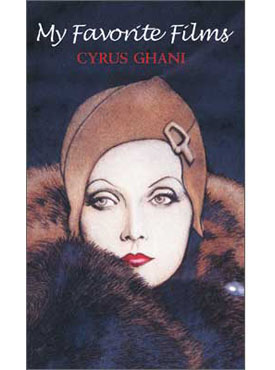About the Book
In this panoramic guide by one of the world’s most knowledgeable movie enthusiasts, Cyrus Ghani reviews more than six hundred and fifty of the big screen’s finest offerings. An international lawyer and eminent historian, Ghani has lived on three continents and is fluent in several languages, affording him a uniquely broad perspective on cinema. His love affair with movies began, he says, at the age of eight and has lasted a lifetime. My Favorite Films is the result—the work of an avid fan, keenly insightful, highly informative, and happily free of the arcane terminology and analysis of academic film criticism. In these pages, Ghani moves from early silent classics like Buster Keaton’s The General and Charlie Chaplin’s City Lights to the films of Billy Wilder and John Huston, the Ealing Studios capers, famed Ernst Lubitsch romantic comedies, the countless, finely-crafted films by Max Ophuls, and recent hits like The Silence of the Lambs and L.A. Confidential—a journey of exploration that will excite and delight film aficionados and occasional viewers alike.
Reviews
- “Cyrus Ghani’s voracious appetite for films is matched by his vast fund of knowledge, and his gift for making his enthusiasm palpable in print. This is a book for every movie lover’s library.”
- — Joe Morgenstern, Film Critic, Wall Street Journal
- “Ghani is unique: a scholar and film obsessive of vast erudition who owes no favors to man or studio. Who else, writing of Hollywood, can offer such pure wine.”
- — John le Carré, Author The Spy Who Came in From the Cold
- “Cyrus Ghani, whose encyclopedic knowledge of cinema is equalled only by his passion for the art, celebrates a lifetime of movie-going with a challenging, well-argued and highly personal selection…It is a book every movie addict will learn from, argue with, and enjoy.”
- — A. Alvarez, Poet & Critic
- “This is a movie fan’s book, written for ardent fans by an ardent, eclectic and perceptive fan. An ideal gift for movie-struck people.”
- — Arthur Schlesinger, Jr., Historian
- “What fun reading Ghani…he truly loves the movies and passes his love affair, knowledge and experience on to the reader.”
- — Leslie Linder, Film Producer
Excerpt
The African Queen
1951. 105 min. color. U.S. Prod. Sam Spiegel; Dir. John Huston; Scr. James Agee, John Huston (based on the novel by C. S. Forester); Cin. Jack Cardif; Ed. Ralph Kemplen; Mus. Allan Gray; Cast: Katharine Hepburn, Humphrey Bogart, Robert Morley, Peter Bull, Theodore Bikel.
It is late 1914 in an unnamed East African territory. World War I had begun in August. Both Germany and Britain have colonial possessions in East Africa and a conflict is inevitable. Charley Allnut (Humphrey Bogart), a Canadian blacksmith, had come to East Africa some time ago to work on a British railroad project as a mechanic of sorts. He had stayed after completion of the project and with his wages had bought a dilapidated steamer that he named African Queen. He has begun trading with the villages on the banks of a river. At one of his regular stops he warns Reverend Samuel Sayer (Robert Morley), a British Methodist minister, and his spinster sister Rose Sayer (Katharine Hepburn) that they should leave as German soldiers may soon occupy all the villages along the river. The reverend and his sister have come to Africa to make Christians of the natives and they are determined to stay put. A good shepherd does not abandon his flock. On his next trip Allnut finds that German soldiers have already raided the village and burnt all the native huts, forcing the villagers to leave. Reverend Sayer has died of an injury from a blow by a rifle butt and sunstroke. Allnut buries the reverend and pleads with his shocked sister to come somewhere safe as the Germans may be back. Rose gathers her meager belongings and the boat heads down the river, which empties into a large lake. The pair must pass a German fort and then navigate deadly rapids. The lake itself is controlled by a large German steamship, The Louisa, which prevents Britain from sending troops to any of the outlying villages.
The film, which up to now appeared to be merely an adventure story, takes on other dimensions. Allnut and Rose begin to change each other. Rose throws away Allnut’s gin bottles and convinces him that it is their duty as subjects of the British Empire to do their share for the war. They could, if Allnut put his mind to it, fashion a torpedo from the oxygen tanks and explosives on the boat. Allnut thinks she is out of her mind. Soon, however, they begin to fall in love. They become “Charley” and “Rose.” He becomes a Christian soldier and she becomes aware of the beauty of nature. They gain a new purpose and commitment. They devise a crude torpedo, but a fierce storm throws them overboard and they are picked up by The Louisa. They are judged to be spies and the captain orders them to be hanged. However, the captain grants their last wish and marries them. Just before they are to be hanged there is a massive explosion and The Louisa is sunk in the most unexpected way. Charley and Rose swim to safety.
The African Queen is a well-directed and well-photographed film, and the acting is superb. If the film had been made in the eighties or nineties the emphasis would have been on the storm, the rapids and the explosion. Huston made it a story of Charley and Rose. Just the two people in the boat bring a vibrant energy to the film. Bogart won his first and only Academy Award for best actor.
All About Eve
1950. 138 min. b.w. U.S. Prod. Darryl F. Zanuck; Dir. Joseph L. Mankiewicz; Scr. Joseph L. Mankiewicz (based on the story The Wisdom of Eve by Mary Orr); Cin. Milton Krasner; Ed. Barbara McLean; Art. D. Lyle Wheeler, George W. Davis; Mus. Alfred Newman; Cast: Bette Davis, Anne Baxter, George Sanders, Celeste Holm, Gary Merrill, Thelma Ritter, Marilyn Monroe, Hugh Marlowe, Gregory Ratoff.
Margo Channing (Bette Davis) is appearing on Broadway in Aged in Wood, written by Lloyd Richards (Hugh Marlowe) and directed by Bill Simpson (Gary Merrill), all well established in the theater. Simpson is romantically involved with Margo. One night, Karen Richards (Celeste Holm), the wife of the playwright, brings Eve Harrington (Anne Baxter) to Margo’s dressing room. Karen has seen Eve night after night near the stage door. Eve has seen every one of Margo’s performances for the past six months and considers Margo the greatest actress in the world. Eve talks of her difficult childhood, her struggle to make a living and losing her husband in the war. Nearly everyone in the room is reduced to tears. Birdie Coonan (Thelma Ritter), Margo’s devoted personal maid and dresser, however, feels the story is too pat. Eve’s tale, she says, “had everything but bloodhounds snapping at her rear end.” Margo reprimands her for her insensitivity and takes Eve in as her companion. Soon she becomes Margo’s efficient secretary.
Margo is vain and obsessed about growing old. She has just turned forty and is insecure, especially about her relationship with Simpson, a younger man. Birdie warns Margo that the young Eve appears to be studying her every gesture and mannerism, apparently in an attempt to model herself on Margo. To be rid of Eve, Margo convinces the producer, Max Fabian (Gregory Ratoff), to give Eve a job in his office. In no time at all Eve manages to become Margo’s understudy. Karen, annoyed at Margo’s treatment of the apparently simple, hard-working Eve, wants to teach Margo, her best friend, a lesson in humility. Karen arranges for Margo to miss a performance and Eve substitutes for her. Eve, knowing that she will go on stage that day, invites Addison De Witt (George Sanders), the most influential critic in New York, to view the show. Addison gives her performance a glowing review that suggests the time has come for younger actresses to play roles written for younger women. Eve’s career in the theater is launched and Margo contentedly decides to retire and marry Bill Simpson. After having made no romantic headway with Bill, Eve goes after Lloyd Richards, who is in a position to write plays for her. Meanwhile, Addison checks into Eve’s background and discovers that she is a calculating liar who has fabricated everything about her past. With one of the best pieces of dialogue in the film Addison makes his move, telling Eve: “You’re an improbable person Eve, and so am I. We have that in common. Also, an inability to love or be loved…. We deserve each other.” The scene is cathartic. It allows the viewer to vent all the hostility built up towards the scheming, unprincipled Eve. Her flight of fantasy has come to an end. From here on she belongs to Addison. The final scene in which an admiring young stage-struck girl will surely become Eve’s companion hints far too obviously that history is about to repeat itself.
The film belongs to George Sanders. He walks away with every scene he is in and he has the best lines with which to work. At a party at Margo’s apartment, he brings an aspiring actress (Marilyn Monroe) and introduces her as “a graduate of the Copa Cabana school of acting.” It is also Bette Davis’ best role. As a rule, Davis was too mannered an actress. In broadly playing a Broadway star, though, she fits perfectly. Thelma Ritter, Celeste Holm and Gregory Ratoff are well cast, but the other performances are uneven. Anne Baxter, an overrated actress, is only passable. All About Eve is one of the more literate films to come out of Hollywood. It debunks the myth that Broadway is gentler than Hollywood and that talent is more readily recognized with no need for hype or manipulation. Joseph Mankiewicz has been underrated, especially by critics in Europe, because he made literate films with no unusual camera angles or cinematic storytelling. He was always a competent director and made some fine films: A Letter to Three Wives (1948), which he also scripted, and Julius Caesar (1953). There are well-photographed scenes in All About Eve, but the script transcends the visual artistry. It won six Academy Awards, including best picture, director, screenplay and supporting actor (George Sanders).
All Quiet on the Western Front
1930. 105 min. b.w. U.S. Prod. Carl Laemmle, Jr.; Dir. Lewis Milestone; Scr. George Abbott, Maxwell Anderson, Dell Andrews (based on the novel by Erich Maria Remarque); Cin. Karl Freund, Arthur Edeson; Ed. Edgar Adams, Milton Carruth; Art D. Charles D. Hall, William R. Schmidt; Mus. David Broekman; Cast: Lew Ayres, Louis Wolheim, John Wray, Slim Sommerville, Ben Alexander, Beryl Mercer, Arnold Lucy.
The film recounts the story of one German soldier, Paul Baumer (Lew Ayres), who together with fellow students in a gymnasium (secondary school) are goaded into enlisting by the exhortations of a war-mongering teacher who advocates military glory for the “fatherland.” We follow their training by a seasoned veteran, Corporal Katczinsky (Louis Wolheim), who becomes a father figure to the boys. Barely ready, they are thrust onto the front lines in 1916 and their platoon is slowly decimated. This gradual but relentless disintegration is symbolized by a pair of soft leather boots that passes from one soldier to the next as they are killed.
There are a number of memorable scenes. One is the encounter of Paul with a young French soldier whom he bayonets in a foxhole. As the Frenchman lies dying, Paul begs his forgiveness. Another is Paul carrying the wounded Katczinsky on his back, talking nonstop about the future when the war ends, not knowing that Katczinsky is already dead, killed by a shell fragment. The most moving is the closing scene. Paul is in a trench and suddenly sees a butterfly. He extends his hand and slightly raises his head to catch it. There is the sound of one shot and we see his hand go limp. The image of the butterfly amidst the carnage and slaughter is profoundly moving.
One of the greatest and most vivid antiwar films, the battle scenes have a documentary-like realism that is emotionally draining. Made during the early advent of sound in 1930, All Quiet on the Western Front broke ground in other respects as well. War films of the silent era, with the possible exception of The Big Parade (1925), depicted war as a great and noble adventure that featured bravery, manliness and camaraderie. This film delineates the horrors of war. We see the scale of suffering of the ordinary soldier and the ultimate futility of his sacrifices. The film is a faithful version of Erich Maria Remarque’s novel, albeit in a more concise form. It was a daring enterprise at the time, especially given the fact that it sympathetically depicts the ordeal of a German soldier barely ten years after the end of a war in which the United States fought against Germany. The force of the novel and the excellent innovative direction of Milestone make us feel the same sorrow for the German as we do for the French soldier, both of whom are nothing more than pawns in a senseless war, a catastrophe the world allowed itself to stumble into in 1914. The film was banned in Germany, France and Poland, and was also badly received in certain quarters in the U.S. for its pacifist content. Acting honors go to Louis Wolheim who creates a memorable character with a minimum of dialogue. The rest of the cast, including the novice Lew Ayres, competently handle their roles. The film received Academy Awards for best picture and best director, and nominations for its screenplay and cinematography.
All the King’s Men
1949. 109 min. b.w. U.S. Prod. Robert Rossen; Dir. Robert Rossen; Scr. Robert Rossen (based on the novel by Robert Penn Warren); Cin. Burnett Guffey; Ed. Al Clark; Mus. Louis Gruenberg; Cast: Broderick Crawford, Joanne Dru, John Ireland, Mercedes McCambridge, John Derek, Shepperd Strudwick, Anne Seymour, Raymond Greenleaf, Will Wright, Ralph Dumke.
The story recounts the rise and fall of a ruthless politician, Willie Stark (Broderick Crawford), who is modelled on Huey Long, the King Fish, who served as governor of Louisiana from 1928 to 1931 and senator from 1932 to 1935. Having built one of the most dominant political machines in the nation’s history, Long continued to run the state, even while serving in Washington. He was assassinated in 1935 by a 29-year-old physician whose sister may have been raped by Long. (Long was killed when he was a senator but the film’s main character is assassinated while governor). The political dynasty Long established dominated Louisiana for over three decades after his death, into the early seventies. His son, Russell, served several terms in the U.S. senate and his brother, Earl, was governor. Huey Long ran a populist campaign of “share the wealth” that gained a national following. Had he lived, he may well have formed a third party to challenge Roosevelt for the presidency in 1936.
The film is set in a southern state and is told through the eyes of Jack Burden (John Ireland), an aimless former journalist who starts off as Stark’s press agent and ends as his chief hatchet man. We first see Stark as a poor but honest country boy who has become a lawyer by attending night school. After the collapse of a school building with many casualties he begins a campaign against the crooked politicians who had been bribed by unscrupulous building contractors. His success and popularity bring him to the attention of state politicians who put him up as a candidate for governor in a three-man race. Their hidden agenda is to have Stark split the vote with the reformist candidate, enabling their crooked candidate to be elected. By the time Stark realizes he is being used, it is too late. Four years later, however, he runs again for governor, this time on his own. He is elected by the votes of the poor and downtrodden. As governor he starts massive public projects; roads, bridges, schools, hospitals and irrigation schemes. The result is an accumulation of such power that soon he is in a position to control the press and radio, and to silence all who oppose him. These changes spill over into his private life. He ignores his wife and uses his son. Sadie Burke (Mercedes McCambridge), a campaign manager, becomes his first mistress. She is soon discarded and he takes up with Anne Stanton (Joanne Dru), Jack Burden’s fiancée. When threatened with impeachment for crooked dealing, Stark blackmails Anne’s father, a distinguished and influential judge, to use his influence on Stark’s behalf, driving the judge to suicide. He soon has national ambitions that are brought to an abrupt end when he is assassinated by Anne’s brother, Adam (Shepperd Strudwick). Stark’s last words are “God, don’t let me die. I have so much to do.”
All the King’s Men is based on the 1946 Pulitzer Prize-winning novel by one of America’s important literary figures—the poet, novelist and literary critic Robert Penn Warren. Warren learned the intricacies of Louisiana politics as a professor of English literature at Louisiana State University (LSU) during the height of Long’s power. LSU was backed financially by Long against the more prominent Tulane University. The novel has biblical allusions to original sin. Rossen’s film is less concerned with theology than the corrupting influence of power; not just those who possess it, but those on its periphery as well. Stark is a brutal political animal who creates a semi-fascist state. There are no sympathetic characters either in the novel or the film. The novel is as much about Jack Burden, the man who loses his idealism, as it is about Willie Stark, but the film blurs Burden’s fall. Everyone soon compromises and sells out; Jack Burden, Anne and Adam Stanton and Sadie Burke. Rossen also depicts the instability and volatility of the electorate and how the voter can be swayed and deceived.
The acting is superb. Broderick Crawford, a “B movie” actor, got the role of a lifetime in this film and gives one of the great performances of American movies—a performance he never equaled. Mercedes McCambridge in her film debut is very good. John Ireland and Raymond Greenleaf, as Judge Stanton, are more than competent. Will Wright and Ralph Dumke are perfect as rural political bosses. The film was shot in Stockton, in northern California, and Rossen used hundreds of townspeople as extras and bit players. This, coupled with the excellent cinematography of Burnett Guffey, gave the film realism. Rossen never matched his work on this film. He had difficulties with the House Un-American Activities Committee throughout the fifties, and only much later, in 1961, did he make a superior film: The Hustler. All the King’s Men won Academy Awards for best picture, best actor (Crawford) and best supporting actress (McCambridge).
Amarcord
1974. 127 min. color. Italian. Prod. Franco Cristaldi; Dir. Federico Fellini; Scr. Federico Fellini, Tonino Guerra; Cin. Giuseppe Rotunno; Ed. Ruggero Mastroianni; Art D. Danilo Donati; Mus. Nino Rota; Cast: Magali Noel, Bruno Zanin, Pupella Maggio, Armando Brancia.
Set in Romagna on the Adriatic Coast of Italy in the mid-thirties, the film is a recollection some forty years later of a year in the life of Titta (Bruno Zanin), a boy in his late teens. It is a plotless film comprised of dreamlike episodes that had made a deep impression on the young boy. His father, Aurelio (Armando Brancia), is a construction foreman with a volatile temper. He is hard working and supports some six people. He is a staunch socialist opposed to the fascist regime of Mussolini. Titta’s mother, Miranda (Pupella Maggio), is a cheerless and melancholic woman who is always quarreling with her husband. She has two brothers: one is in an insane asylum, the other lives off Aurelio. Titta’s grandfather is a jolly old man who still enjoys pinching and chasing women. Titta also has a younger, undisciplined brother. Titta’s father is disappointed in him because he has yet to find a job. The focus of Titta’s life is sex, whether vicarious or self-gratified. He is taken by his mother to confession. The priest asks him if he masturbates and Titta begins to drift off, visualizing all the desirable women in town. The most attractive is Gradisca (Magali Noel), the hairdresser. In the early evenings she and two friends walk along the main street, provocatively swinging their hips. Gradisca is madly in love with Gary Cooper and sees all his films. We get glimpses of other women in the town, typical Fellini circus-like characters: the tobacco shop owner who weighs close to 250 pounds, and the mad Volpina who gives herself freely to any man. We see scenes of Titta’s school where, again, the object of his daydreams is a buxom teacher.
We also witness a year in the life of the town. The film begins with the end of winter and celebration of the coming spring with a huge bonfire in the main piazza. The summer is marked by the sailing of a transatlantic ocean liner, Rex, off the coast of Romagna. Autumn brings the death of Titta’s mother, which devastates his father. It also includes the marriage of Gradisca, not to Gary Cooper but to a local policeman. We witness suffocating political conformity and the mass hysteria of fascist rallies. There are few voices of dissent, but Titta’s father insists on wearing his socialist tie. He is taken to the Fascist headquarters where he is forced to drink a bottle of castor oil.
Fellini was born in Rimini, a seaside town much like the one in the film, and left in 1938 at the age of eighteen. Amarcord, which means “I remember” in the Romagna dialect, is partly autobiographical. Most of Fellini’s films, beginning with I Vitelloni (1954), have a confessional element. In La Dolce Vita (1962) the main character is modeled on himself and 8 1/2 (1963) is unmistakably autobiographical. All these confessional and autobiographical films deal with elements of personal guilt. There are many glorious scenes in this film. The radiantly lit ocean liner becomes real through the beautiful photography of Giuseppe Rotunno and the art direction of Danilo Donati. There is also a haunting musical score by Nino Rota.
The Asphalt Jungle
1950. 112 min. b.w. U.S. Prod. Arthur Hornblow; Dir. John Huston; Scr. Ben Maddow, John Huston (based on the novel by W. R. Burnett); Cin. Harold Rosson; Ed. George Boemler; Art D. Cedric Gibbons, Randall Duell; Mus. Miklos Rozsa.; Cast: Sterling Hayden, Louis Calhern, Jean Hagen, James Whitmore, Sam Jaffe, John McIntire, Marc Lawrence, Marilyn Monroe, Barry Kelly, Anthony Caruso, Brad Dexter.
Aging master criminal Irwin “Doc” Riedenschneider (Sam Jaffe), just released from prison, has one last job in mind—the robbery of an upscale jewelry company in a midwestern city. His first contact is Cobby (Marc Lawrence), a bookie who introduces him to Alonzo Emerich (Louis Calhern), a prominent but shady lawyer who agrees to bankroll the job and fence the jewels, giving Doc and his gang one million dollars in cash. Unknown to the others, Emerich is broke and plans to steal the jewels after the robbery. He convinces the unsuspecting Cobby to finance the job. Doc assembles his assistants methodically: Louis Ciavelli (Anthony Caruso), a professional safecracker, for $25,000; Gus Ninissi (James Whitmore), who operates a small diner, as the getaway car driver for $10,000; and Dix Handley (Sterling Hayden), an aimless petty hoodlum who dreams of buying back his father’s Kentucky horse farm, for $15,000. Doc has planned the robbery meticulously and his assistants know precisely what they have to do. His plan works perfectly until Ciavelli is shot in a freak accident and later dies. Still later, Emerich’s bodyguard (Brad Dexter) is killed and Doc’s perfect plan begins to unravel.
Huston, working with a first-rate script prepared by Ben Maddow and himself, develops some ten characters incisively in a 112 minute film without affecting the pace. There are numerous examples. In a thirty-second scene at the very beginning of the film we see Doc carefully examining a girlie calendar at Cobby’s betting shop, preparing us for his arrest in the last scene as a result of his voyeurism. At one point early in their meeting, Emerich asks Doc, “What is it like for a man with your tastes behind bars for seven years?” Doc answers, “It is a matter of temperament.” Emerich says, “I couldn’t take it.” The scene prepares us for his suicide at the end of the film. Cobby is shown to be weak, and later when arrested, he predictably breaks down and names the participants in the robbery. Gus, on the other hand, has been loyal to his friends throughout, and doesn’t break when arrested. Dix owes some gambling debts to Cobby. Though given an extension, he feels humiliated. He borrows the money from his friend Gus and repays Cobby in full. Dix also shows his sense of honor in the way he treats Doll (Jean Hagen), a chorus girl out of a job with no place to stay. The thieves are better people than Emerich, who neglects his invalid wife, keeps a mistress (Marilyn Monroe), and intends to double-cross the people who trust him. Huston’s sympathies are clearly with the thieves. At one point, Emerich explains to his unsuspecting wife that he occasionally has to represent criminals, adding, “Crime is only a left-handed form of human endeavor.” Huston attempts to tell us that there is only a fine line separating a big-time lawyer and a big-time criminal, and that the personal ethics of the latter may be preferable.
Acting honors go to the entire cast. Hayden, Calhern, Jaffe and Whitmore are excellent. Jean Hagan, who was wasted at MGM (she was given only one decent role in her career, the 1952 Singin’ in the Rain), gives a very good performance. Even Marilyn Monroe handles her brief role well. The cinematography is excellent. Most of the film takes place in a dirty, overcast city. Only in the very last scenes when the mortally wounded Handley and Doll have left the asphalt behind and are driving in the Kentucky countryside does the sun come blazing through. The score by Rozsa is excellent. Although a much copied film, none come anywhere near this almost perfect film noir.
About the Author
Cyrus Ghani is a lawyer and scholar specializing in Iranian studies. He is the author of Iran and the Rise of Reza Shah and Iran and the West: A Critical Bibliography. He was born in Iran and has lived in Tehran, Los Angeles, London, and New York City, where he now resides.
Mage has published his books Iran and the West, Man of Many Worlds: The Diaries and Memoirs of Dr. Ghasem Ghani,Iran and the West A Critical Bibliography, 1500-1987, Volume 1, Shakespeare, Persia, and the East, and My Favorite Films.








